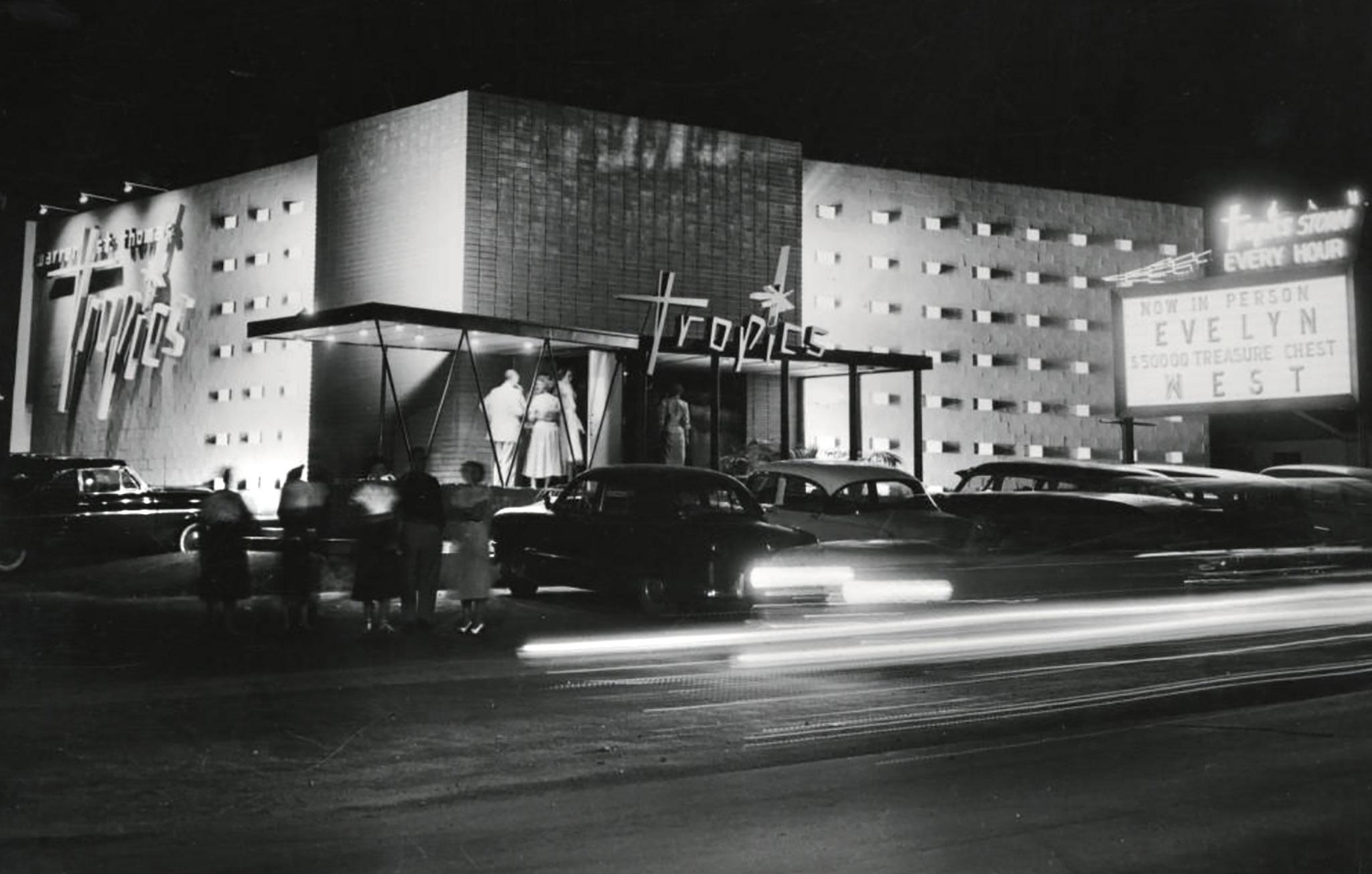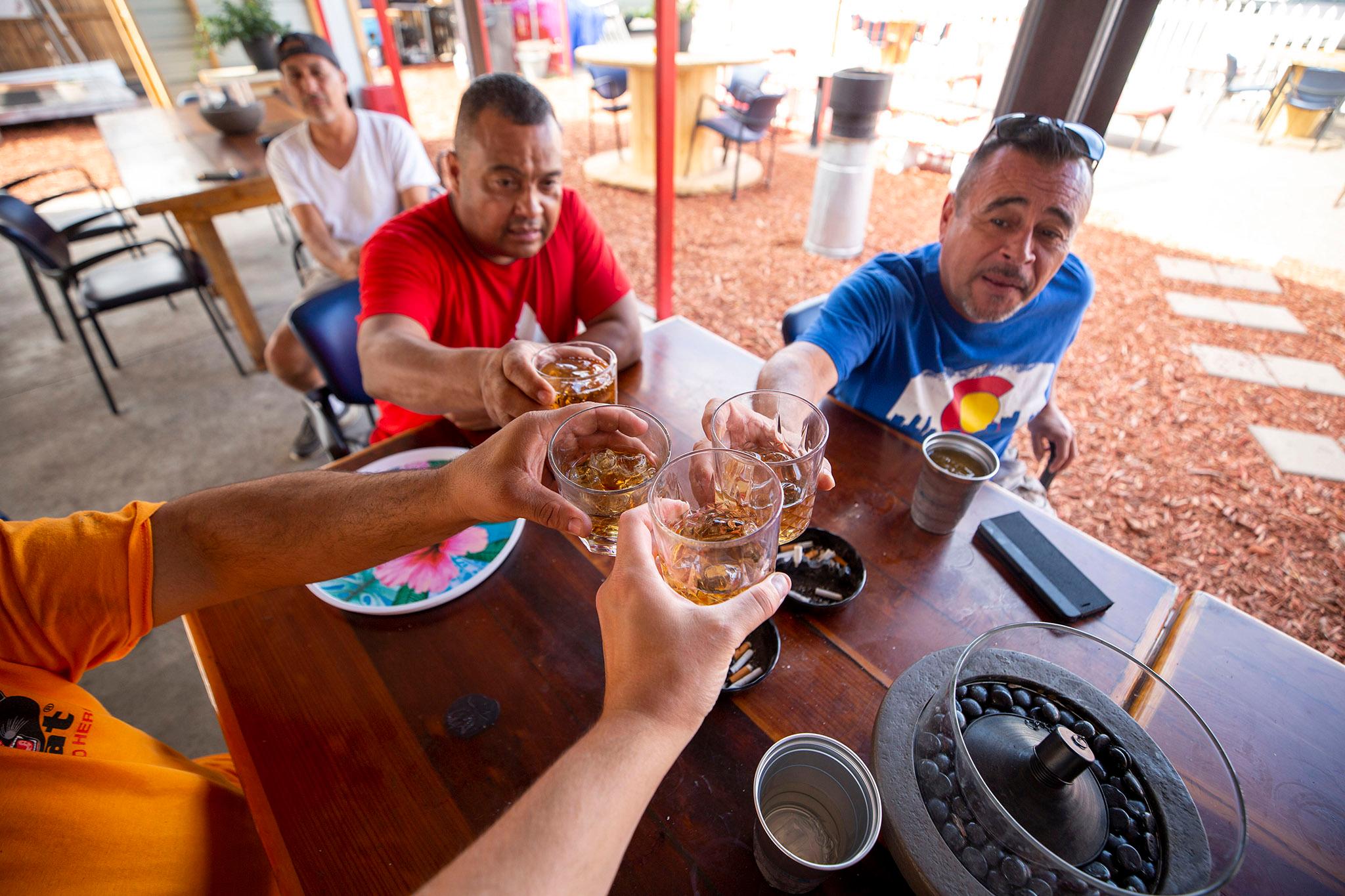It's 2:30 p.m. on a Monday, the day off for this reporter, but I've been instructed to show up at Boogie Down on Morrison Road at this specific time. The reason becomes clear upon arrival: owner Ron Martinez is holding court on the patio. And he asks: What am I drinking?
Martinez grew up not far from his bar, which sits at the southwest end of Morrison's diagonal span through Westwood. He's surrounded by his buddies - Ed Martinez, Rich Medina and "Juice J. Rod" - who grew up in the neighborhood, too. They used to run rampant on these streets, they tell me. Once, a few of them tossed a couch over the fence and into the outdoor pool at Garfield Lake Park. They sat on it, in the water, until the cops showed up.
"We all grew up together. All of us have been friends since the elementary school days," Medina says. "We're all in our 50s and we're still friends! How many people you know that still talk to their friends? I can't even stand these guys!"
They're into other things now, Martinez says. Since he bought the bar, eight years ago this month, he's put on Christmas gift give-aways and back-to-school backpack drives. His annual trick-or-treat event is also a car show. Sunday nights are menudo nights. Many Sunday afternoons are reserved for the Broncos. Other times, like this one, are for hanging with old pals.

Surviving this long on this end of Morrison isn't easy for a business, Martinez says. He's been successful - and even did OK when COVID-19 measures limited business - because he ultimately understands what his neighbors want and need.
"The reason the Boogie gets down is because we take care of our people and our people take care of us," he says as we sip some kind of sweet whiskey. "This is my heart. These people are my people. We are Westwood."
The neighborhood looked different when these guys were growing up.
Medina said his grandparents bought a home up the street in 1948, before Denver annexed Westwood and when Morrison was still a dirt road that ran through farmland directly to the foothills. He and his mom still live in that house.
"This was a high-class place if you look it up," Martinez added.
A few blocks north, a hulking building that will soon house the Stone dispensary was once the Warren St. Thomas Tropics, a strip club where famous burlesque dancer Tempist Storm once performed. An old photo of the joint in the Denver Public Library's collection shows it looked like a place Humphrey Bogart might have hung out.

Rock radio station KBPI used to broadcast nearby. Chubby's had a location down here, which Martinez said had the best chili fries in the city. His grandfather also once ran a shoe shop up the street.
When they were kids, Medina tells me, most of his neighbors were English-speaking Chicanos. Many of them owned their homes, but as they aged into the 1980s, they began hand off properties to their children, who often sold or rented out their properties.
"When the renting came in, that's when Westwood started going bad, and that was in the '90s," he said.
According to city records, most of Westwood was "40 to 60 percent" owner-occupied in 1977. That grew to "50 to 80 percent" by 1990. But by 2010, U.S. Census data show owner-occupied homes in the neighborhood was back down to 40 percent. That figure has slowly dropped ever since.

When Medina said Westwood "started going bad," he meant the area started to feel neglected. Violence became a problem, too. We ran this by Santiago Jaramillo, an artist who grew up here, who told us rising gang activity played a major role in the decline. In particular, he said the 1988 release of the movie "Colors" glorified outlaw lifestyles and sparked new gang violence all over the city.
Be it homeownership rates, decline or a lack of investment, the guys at the Boogie told me Westwood is heading in the right direction.
Martinez said his block was "dark" when he opened the bar.
"Then I lit it up, and everybody had to fix their lights," he said as we went for another round.
A new apartment building is getting ready to open up across the street, which contains some affordable housing units. To Martinez, that place represents a growing customer base and fresh faces on the block. He and his buddies aren't so worried that change will end up gentrifying the neighborhood.
"S*** we need the character to change," he said. "It was kind of, you know, crumbling. So now we're rebuilding it. It's gotta change. Change is not bad."


James Chavez, who also grew up with Martinez and recently took over the Boogie Down's kitchen operation, said the city is starting to appreciate this part of town in a way it deserves. He has a lot of hope for Westwood.
"This neighborhood needs a lot of work and a lot of love, and now it seems like a lot of people in office are looking at this neighborhood and trying to do something about it," he told me as he took a break from cooking burritos and tamales. "I'm waiting and seeing how it's going to look, how it's going to be improved."


And Martinez's cousin, Ernie Lopez, who showed up midway through our conversation, told me he'd rather not see this place turn out like the Highlands. So far, he said, it's not heading that way.
"You can see the gentrification happening, but it's not happening as rapidly as, say, over in the Northside. Like LoHi is just crazy, totally different now," he said. "It's happening, it's just not as dramatic. I see it because I grew up over here."

Whatever happens here, these guys told me they're not going anywhere. Martinez intends to open the doors of his honky tonk to anyone who moves in. The rest of them know where to go when they need a beer or a friendly ear on a sunny afternoon.
Just one thing, Martinez says after a round of whiskeys. At his bar: "Don't ever dance. We boogie."













